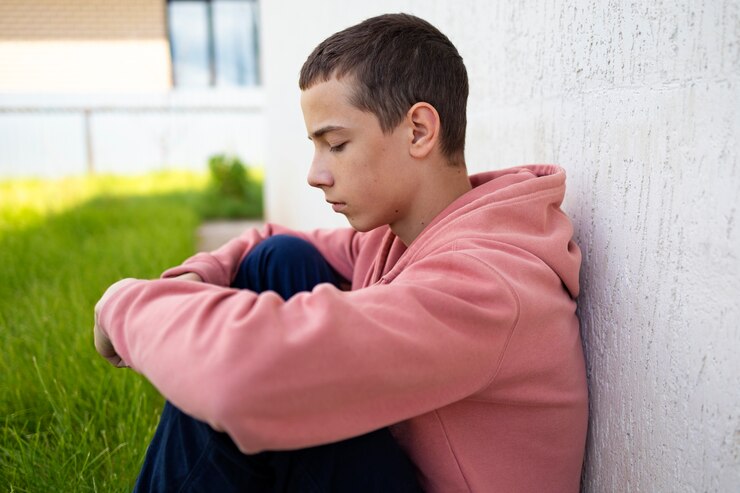Breaking the Silence: Understanding and Supporting Children with Depression
Empowering dialogue on childhood depression: insights and strategies for nurturing support and understanding. Children with Depression.
 In today’s fast-paced and high-pressure society, children are not immune to the challenges of mental health. It’s time we break the silence and shed light on an often overlooked issue: childhood depression. Understanding and supporting children with depression is a vital step in helping them overcome this debilitating condition. In this article, we dive deep into the world of childhood depression, exploring its causes, symptoms, and potential long-term effects. We will provide valuable insights into how parents, teachers, and caregivers can recognize the signs of depression in children and offer the support they desperately need. By breaking down the stigma surrounding childhood depression, we can create a more nurturing and inclusive environment where these young individuals feel safe to express their emotions. Our aim is to equip you with the knowledge and tools necessary to identify and address this silent struggle, ultimately fostering resilience and hope in children who need it most. Join us in this important journey of understanding and supporting children with depression, as we work together to make a positive impact on their lives.
In today’s fast-paced and high-pressure society, children are not immune to the challenges of mental health. It’s time we break the silence and shed light on an often overlooked issue: childhood depression. Understanding and supporting children with depression is a vital step in helping them overcome this debilitating condition. In this article, we dive deep into the world of childhood depression, exploring its causes, symptoms, and potential long-term effects. We will provide valuable insights into how parents, teachers, and caregivers can recognize the signs of depression in children and offer the support they desperately need. By breaking down the stigma surrounding childhood depression, we can create a more nurturing and inclusive environment where these young individuals feel safe to express their emotions. Our aim is to equip you with the knowledge and tools necessary to identify and address this silent struggle, ultimately fostering resilience and hope in children who need it most. Join us in this important journey of understanding and supporting children with depression, as we work together to make a positive impact on their lives.
The importance of understanding childhood depression
Childhood depression is a serious mental health issue that requires attention and understanding. Recognizing the importance of understanding childhood depression is crucial in addressing the needs of affected children. By educating ourselves about this condition, we can better empathize with the experiences of these children and provide them with the support and resources they require to cope and thrive.
 Signs and symptoms of depression in children
Signs and symptoms of depression in children
Identifying the signs and symptoms of depression in children is essential for early intervention and support. While some symptoms may overlap with those seen in adults, depression in children can manifest differently. These may include persistent sadness, irritability, changes in appetite or sleep patterns, withdrawal from activities, decreased energy, and thoughts of self-harm or suicide. Understanding these signs can help caregivers and educators recognize when a child may be struggling with depression.
Common causes and risk factors for childhood depression
Childhood depression can stem from a variety of factors, including genetic predisposition, biological differences in brain chemistry, traumatic life events, chronic illness, family conflict, and academic or social pressures. Recognizing these common causes and risk factors can aid in understanding why a child may develop depression and inform efforts to provide appropriate support and intervention.
The impact of depression on children’s daily lives
Depression can have profound effects on a child’s daily life, impacting their academic performance, social interactions, physical health, and overall well-being. Children with depression may struggle to concentrate in school, experience difficulties forming and maintaining relationships, and engage in risky behaviors. Understanding the multifaceted impact of depression on children’s lives underscores the importance of early intervention and comprehensive support.
 How to support a child with depression
How to support a child with depression
Supporting a child with depression requires patience, empathy, and a proactive approach. It’s essential to create a safe and nurturing environment where the child feels comfortable expressing their emotions without fear of judgment. Encouraging open communication, providing reassurance and validation, and offering practical assistance can help children feel supported as they navigate their struggles with depression.
Effective communication strategies with depressed children
Effective communication is key to supporting depressed children and fostering a sense of connection and understanding. Listening actively, expressing empathy, and validating the child’s feelings are essential components of effective communication. Additionally, using age-appropriate language, asking open-ended questions, and offering encouragement can facilitate meaningful conversations and promote trust and rapport between caregivers and children.
Seeking professional help for childhood depression
While support from family and caregivers is crucial, professional help may be necessary for children with depression. Mental health professionals, such as therapists, psychologists, and psychiatrists, can provide specialized assessment, therapy, and medication management tailored to the child’s needs. Seeking timely professional help is vital for ensuring comprehensive treatment and promoting the child’s long-term well-being.
 Self-care for parents and caregivers
Self-care for parents and caregivers
Caring for a child with depression can be emotionally challenging and physically draining for parents and caregivers. Prioritizing self-care is essential for maintaining their own mental and physical health while supporting their child. This may involve setting boundaries, seeking support from friends and family, engaging in stress-reducing activities, and accessing professional help or counseling as needed.
Promoting resilience and positive mental health in children
Promoting resilience and positive mental health in children is essential for mitigating the impact of depression and fostering long-term well-being. Building strong social support networks, encouraging healthy coping strategies, fostering a sense of autonomy and competence, and promoting a positive outlook can help children develop resilience and navigate life’s challenges more effectively.
Conclusion: Breaking the silence and creating a supportive environment for children with depression
In conclusion, breaking the silence surrounding childhood depression is a crucial step in addressing the needs of affected children and promoting their mental health and well-being. By understanding the signs, causes, and impacts of depression in children and providing them with the support and resources they require, we can create a more nurturing and inclusive environment where these young individuals feel valued, understood, and empowered to seek help. Together, let us work towards breaking down the stigma associated with childhood depression and creating a supportive community where every child can thrive.




